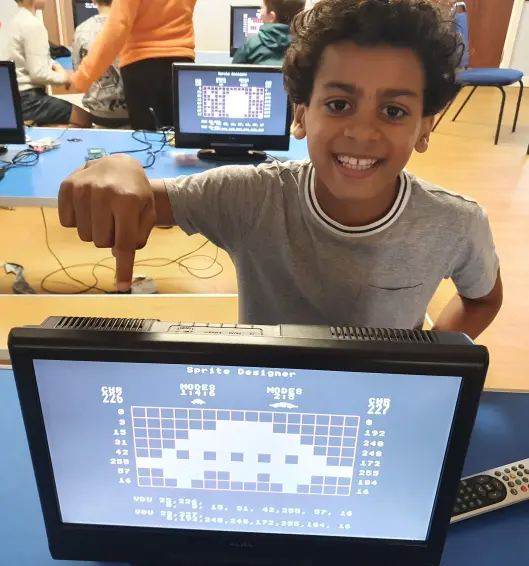
Inspiring the Next Generation
Andrew Rowland | 7 Sept 2022 | 0 comments

Little did I think when I started using computers in the early 1980s that, forty years on, I would be using the same machines to teach programming (or coding, to use the fashionable term), but this summer that was precisely what I was doing. Given how primitive they were compared to today’s – processors ran at 2MHz, memory topped out at 32KB, cassette tape was used for storage and a BBC Micro (my first computer) cost around £1500 at present-day values – surely modern ones are a better option for the next generation of coders! Yet many programmers working now started out with machines like these, and the BBC Micro not only inspired the Raspberry Pi but also directly led to the ARM processor that powers over 95% of all devices in the world.
An old acquaintance of mine jointly runs a company called Educraft (www.educraft.uk), running courses for schools, museums and – under the auspices of the government HAF scheme – holiday clubs, all using retro machines including the BBC Micro. So when he asked me to help out, I jumped at the chance. Kids would join us from one day to the whole week and get two healthy meals, outdoor fun and exercise, and craft activities as well as coding. And of course, no afternoon would have been complete without a session playing old computer games.

 Yes, you can accomplish things today you couldn’t hope to do in the eighties, the highly visual Scratch language being one. But what is really happening under the hood is often hidden, and there’s a complexity that can be off-putting to the beginner. The old computers have an immediacy you don’t get nowadays. Switch on and straight away you are in a programming language designed for beginners, BASIC. The computers even came with a book teaching you how to program them.
Yes, you can accomplish things today you couldn’t hope to do in the eighties, the highly visual Scratch language being one. But what is really happening under the hood is often hidden, and there’s a complexity that can be off-putting to the beginner. The old computers have an immediacy you don’t get nowadays. Switch on and straight away you are in a programming language designed for beginners, BASIC. The computers even came with a book teaching you how to program them.
To get the kid’s interest we started with a simple shoot ’em up game that needed to be completed. Soon they were designing sprites (moving characters) to make theirs unique, then choosing colours, which involved changing a few lines of code. Before long they were thinking of other things they wanted to alter, like adding a score or a ‘cheat’ mode where they get more ammo, and getting their hands dirty understanding how the program worked to make those changes. Further sessions taught basic programming concepts like loops and screen co-ordinates, and by the end they had coded up a program from scratch to move a character across the screen.
It was great to see the levels of engagement and fun the children were having. Some enjoyed it so much that parents were asking where they could buy the Raspberry Pi’s we used to emulate the BBC Micros (a room full of actual 40 year-old computers isn’t really practical). And who knows? While some preferred the games or craft, as you might expect, we may have inspired a number to become the programmers of tomorrow.
You can see examples of the children’s work at https://educraft.uk/get-animated-students-work/.


 Yes, you can accomplish things today you couldn’t hope to do in the eighties, the highly visual Scratch language being one. But what is really happening under the hood is often hidden, and there’s a complexity that can be off-putting to the beginner. The old computers have an immediacy you don’t get nowadays. Switch on and straight away you are in a programming language designed for beginners, BASIC. The computers even came with a book teaching you how to program them.
Yes, you can accomplish things today you couldn’t hope to do in the eighties, the highly visual Scratch language being one. But what is really happening under the hood is often hidden, and there’s a complexity that can be off-putting to the beginner. The old computers have an immediacy you don’t get nowadays. Switch on and straight away you are in a programming language designed for beginners, BASIC. The computers even came with a book teaching you how to program them.







